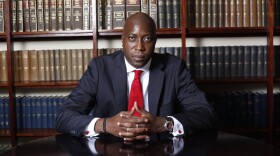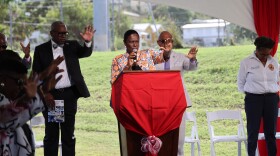ST. CROIX — As health insurance costs continue to rise across the United States, officials in the Virgin Islands are grappling with an expected increase in government employee premiums and evaluating the long-term feasibility of a self-funded insurance model.
Governor Albert Bryan Jr. said during an exclusive interview Monday night with Ernice Gilbert, founder and editor-in-chief of The Virgin Islands Consortium, that health insurance premiums for government employees would be going up “a lot” at the end of this fiscal year.
The governor also said during the interview that he showed senators a presentation about a month ago that outlined how the government could save $25 million a year by sending out an RFP for self-funded insurance.
The chair of the government health insurance board and the Senate president offered insight into the ongoing negotiations for group health insurance and the alternative proposed by the governor.
Beverly Joseph, Government Employees Service Commission Health Insurance Board chair, said an increase in premiums is expected as negotiations continue.
“We are working with our consultant and the carriers to get the best that we can do for the members on the plan,” she said.
The board aims to finalize negotiations at its meeting next Wednesday, with a contingency plan to meet again in July if no resolution is reached, Joseph said. Once negotiations are complete, she said the plan will be submitted to the Office of the Governor for review before moving to the Legislature for ratification. She said the goal is to ratify the new contract in time for an October 1 implementation.
Although an increase in premiums is expected, Joseph pointed out the Legislature has been subsidizing previous increases for the past five years so central government employees and retirees have not seen those increases.
“We don’t know if the Legislature will subsidize or not,” she said, adding that discussion will take place when the board appears before the Legislature.
Senate President Milton Potter said a discussion among lawmakers is necessary to determine if the lawmaking body would be able to identify funds to cover any increase to the premiums, noting the Legislature has subsidized the increases several times in the past. He noted other funding obligations like the Virgin Islands Water and Power Authority, the Virgin Islands Waste Management Authority, and the hospitals.
“It’s still up in the air as to what, if any, the government employees may have to absorb of the health insurance increase,” Potter said.
Although the governor recently suggested the government could save $25 million annually by transitioning to a self-funded insurance program from a fully insured model, both Joseph and Potter expressed caution.
Joseph noted that the GESC Board was not privy to the presentation referenced by the governor and has yet to receive independent verification of the purported savings. She said the insurance carrier bears the upfront cost of health care in a fully insured plan.
“If you don’t pay your premiums — 90 days, 60 days, 30 days — they still pay and upfront that cost,” she said. “And then, of course, we’re going to pay late fees.”
In a self-funded model, Joseph said rebates and discounts are available, but the government has to be ready to pay each claim every month. If the monthly claims total $30 million or $40 million, she said that money must be sitting in the account.
Potter, who participated in the governor’s informal introduction to the concept, echoed similar concerns. He acknowledged the theoretical savings in administrative costs and rebates, but warned the entire program could be at risk without consistent cash flow.
“We have to have robust reserves and excellent cash management,” he said. “I don't think we have robust cash reserves right now. While I think that it may be something that we can work towards, suddenly having the option of doing it or considering doing this for the fall of 2025 for FY 2026, it would be rushed. It would be it would not be responsible for us putting the health insurance of the people of the Virgin Islands at risk.”















